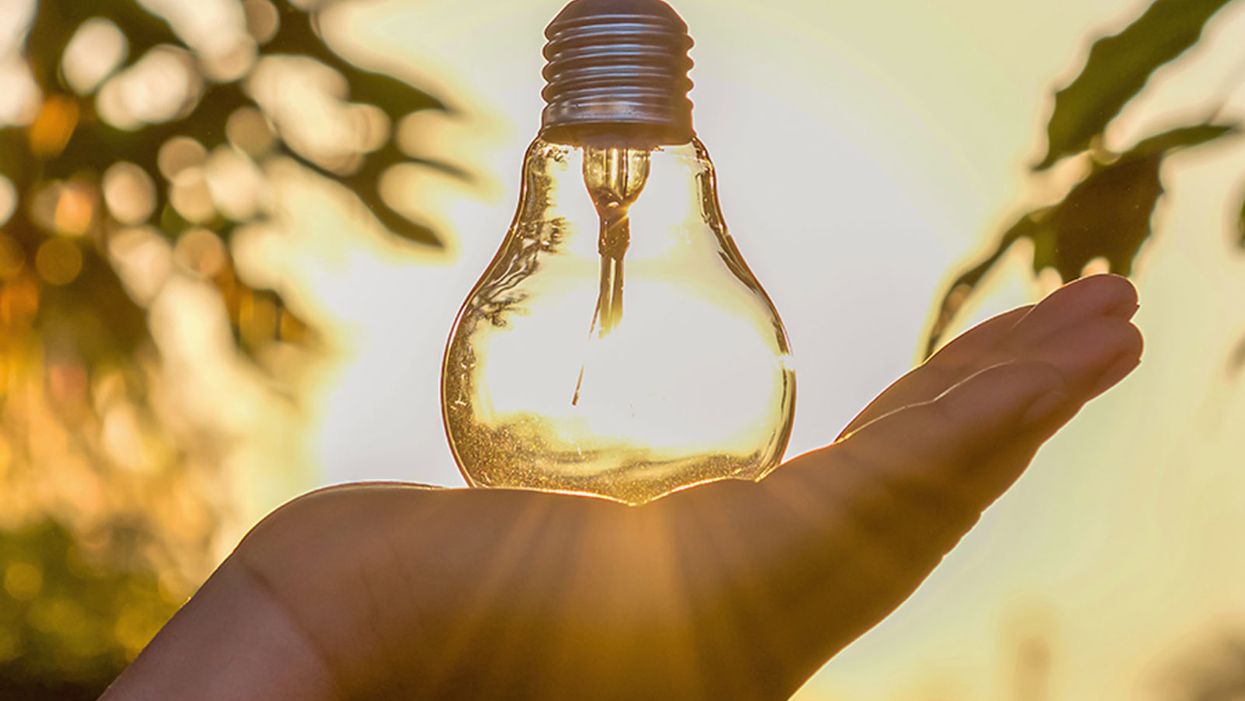Scientists Just Created Liquid Solar Power That Can Be Stored for 18 Years

A team of Swedish scientists has gathered solar power so pure, that until recently, capturing it was an impossibility.
Look no further than this week's climate strikes for evidence that millions of people are passionate about curbing global warming.
Unlike relatively limited solar panel energy storage, norbornadiene can potentially maintain its potency for years.
But even potential solutions, like alternative meats, have their own challenges. Some scientists are putting their focus on the sun to help balance out our energy consumption.
In fact, they are gathering solar power so pure that, until recently, capturing it was an impossibility.
The Lowdown
A group of Swedish scientists has created a liquid called norbornadiene. This liquid sunshine can capture up to 30 percent of raw solar power. To put it in perspective, the best publicly available solar panels can harness 21 percent. Norbornadiene would bring in about 50 percent more power – a significant difference in energy efficiency.
Most notably, unlike relatively limited solar panel energy storage, norbornadiene can potentially maintain its potency for years. We could have the ability to collect and store premium solar power, making it easier for current and future generations to use fossil and nuclear fuel alternatives.
"The norbornadiene molecules that we have made have very good properties, in terms of solar energy capture efficiency, storage time and energy density," says team lead Dr. Kasper Moth-Poulson of the Chamlers University of Technology. "They can store energy without the need for insulation materials for 18 or more years."
Next Up
Swedish scientist Moth-Poulsen and his team have been testing the norbornadiene on the physics building roof at the Chalmers University of Technology. Once activated, it heats up to just below boiling and provides enough power to be useful.
The energy density is 250 watt-hours per kilogram, twice the strength of Tesla's popular Powerall battery.
It requires potentially toxic solvents, like a cobalt-based activator, to transform into its full potential. The team is currently trying to find less-hazardous catalysts to help transform the norbornadiene to its active form, quadricyclane. Exposing it to sunlight is the main way to reactivate the norbornadiene's power. Over time, scientists will likely make it more efficient with less toxic agents.
The energy density is 250 watt-hours per kilogram, twice the strength of Tesla's popular Powerall battery.
Open Questions
The biggest question is safety, perceived or otherwise: Are you ready to drive around with 250 kWh of pure solar in your Hyundai? Norbornadiene may be stable in a hermetically sealed lab, but sculpting it for everyday use requires another level of security.
The half-life of the sunshine power is also an estimate, too. The challenge with new scientific substances is you don't know how the matter will evolve over time. It is easy to be overly optimistic about this one discovery being the key to our energy needs. For the time being, it is wiser to look at norbornadiene as a progressive step rather than a revolutionary one.
Even at its least effective, norbornadiene and its related material is a step toward us utilizing the one natural resource that won't run out for generations. In the short-term, a stable form of it could offset our fossil and nuclear fuel use and even help lower the carbon footprint made by long-distance transportation. It will be fascinating to see what future aircraft builders, home designers and even car manufacturers do as the solar technology conversation heats up.
Moth-Poulsen wants norbornadiene to be a definitive part of the climate change puzzle.
"I hope that in five years, we will see the first products based on our molecules and could help mitigate the daily variations in temperature," he says. "This will lead to increased thermal comfort and reduced energy consumption for heating and cooling."
You won't score many glamor points for using a neti pot, but it could be a worthwhile asset in fighting Covid-19, according to the author's experience and recent research.
Twice a day, morning and night, I use a neti pot to send a warm saltwater solution coursing through one nostril and out the other to flush out debris and pathogens. I started many years ago because of sinus congestion and infections and it has greatly reduced those problems. Along with vaccination when it became available, it seems to have helped with protecting me from developing Covid-19 symptoms despite being of an age and weight that puts me squarely at risk.
Now that supposition of protection has been backed up with evidence from a solidly designed randomized clinical trial. It found that irrigating your sinuses twice a day with a simple saltwater solution can lead to an 8.5-fold reduction in hospitalization from Covid-19. The study is another example of recent research that points to easy and inexpensive ways to help protect yourself and help control the epidemic.
Amy Baxter, the physician researcher behind the study at Augusta University, Medical College of Georgia, began the study in 2020, before a vaccine or monoclonal antibodies became available to counter the virus. She wanted to be able to offer another line of defense for people with limited access to healthcare.
The nasal cavity is the front door that the SARS-CoV-2 virus typically uses to enter the body, latching on to the ACE2 receptors on cells lining those tissue compartments to establish infection. Once the virus replicates here, infection spreads into the lungs and often other parts of the body, including the brain and gut. Some studies have shown that a mouthwash could reduce the viral load, but any effect on disease progression was less clear. Baxter reasoned that reducing the amount of virus in the nose might give the immune system a better chance to react and control that growth before it got out of hand.
She decided to test this approach in patients who had just tested positive for Covid-19, were over 55 years of age, and often had other risk factors for developing serious symptoms. It was the quickest and easiest way to get results. A traditional prevention study would have required many more volunteers, taken a longer period of follow up, and cost money she did not have.
The trial enrolled 79 participants within 24 hours of testing positive for Covid-19, and they agreed to follow the regimen of twice daily nasal irrigation. They were followed for 28 days. One patient was hospitalized; a 1.27% rate compared with 11% in a national sample control group of similar age people who tested positive for Covid-19. Patients who strictly adhered to nasal irrigation had fewer, shorter and less severe symptoms than people in the study who missed some of their saline rinses.
Baxter initially made the results of her clinical trial available as a preprint in the summer of 2021 and was dismayed when many of the comments were from anti-vaxxers who argued this was a reason why you did not need to get vaccinated. That was not her intent.
There are several mechanisms that explain why warm saltwater is so effective. First and most obvious is the physical force of the water that sweeps away debris just as a rainstorm sends trash into a street gutter and down a storm drain. It also lubricates the cilia, small hair-like structures whose job it is to move detritus away from cells for expulsion. Cilia are rich in ACE2 receptors and keeping them moving makes it harder for the virus to latch on to the receptors.
It turns out the saline has a direct effect on the virus itself. SARS-CoV-2 becomes activated when an enzyme called furin snips off part of its molecular structure, which allows the virus to grab on to the ACE2 receptor, but saline inhibits this process. Once inside a cell the virus replicates best in a low salt environment, but nasal cells absorb salt from the irrigation, which further slows viral replication, says Baxter.
Finally, “salt improves the jellification of liquid, it makes better and stickier mucus so that you can get those virus out,” she explains, lamenting, “Nobody cares about snot. I do now.”
She initially made the results of her clinical trial available as a preprint in the summer of 2021 and was dismayed when many of the comments were from anti-vaxxers who argued this was a reason why you did not need to get vaccinated. That was not her intent. Two journals rejected the paper, and Baxter believes getting caught up in the polarizing politics of Covid-19 was an important part of the reason why. She says that editors “didn't want to be associated with something that was being used by anti-vaxxers.” She strongly supports vaccination but realizes that additional and alternative approaches also are needed.
Premeasured packets of saline are inexpensive and can be purchased at any drug store. They are safe to use several times a day. Say you’re vaccinated but were in a situation where you fear you might have been exposed to SARS-CoV-2; an extra irrigation will clear out your sinuses and may reduce the risk of that possible exposure.
Baxter plans no further study in this area. She is returning to her primary research focus, which is pain control and reducing opioid use, but she hopes that others will expand on what she had done.
Podcast: The Friday Five Weekly Roundup in Health Research
In this week's Friday Five: progress on a pill to prevent lung cancer. Plus, ancient wisdom about Neti pots could pay off against Covid, a breakthrough for precision medicine and obesity, the connection between taking a multivitamin pill and brain health - and much more.
The Friday Five covers five stories in research that you may have missed this week. There are plenty of controversies and troubling ethical issues in science – and we get into many of them in our online magazine – but this news roundup focuses on scientific creativity and progress to give you a therapeutic dose of inspiration headed into the weekend.
Listen on Apple | Listen on Spotify | Listen on Stitcher | Listen on Amazon | Listen on Google
Here are the promising studies covered in this week's Friday Five:
- A pill to prevent lung cancer?
- Ancient wisdom about Neti pots could pay off for Covid
- Breakthrough for precision medicine and obesity
- How to refreeze the north and south poles
- The connection between taking multivitamin pills and brain health

